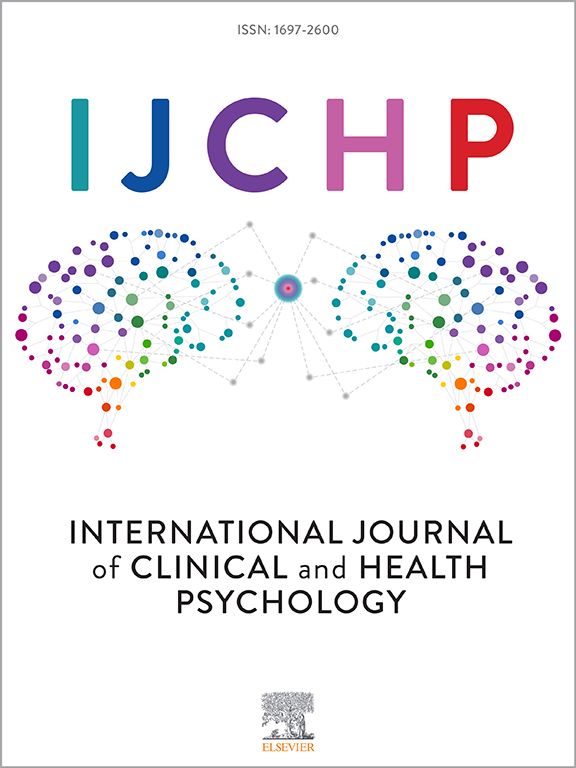Understanding the impact of extreme terrorist events on evacuees and non-evacuees: A study on child aggression and social problems
IF 4.4
1区 心理学
Q1 PSYCHOLOGY, CLINICAL
International Journal of Clinical and Health Psychology
Pub Date : 2024-10-01
DOI:10.1016/j.ijchp.2024.100513
引用次数: 0
Abstract
This study aimed to examine differences between evacuee and non-evacuee parents regarding their experiences following the October 7th terror attack in Israel, and to assess how parental factors—such as exposure, PTS, functioning, resilience, and trust in authorities—were related to perceived behavioral problems in children. The study included 221 evacuee parents and 262 non-evacuee parents, recruited online through a professional survey company. We hypothesized that perceived child aggression and social problems would increase following the terrorist events, with evacuee parents reporting a greater increase in symptoms due to heightened instability and stress. Additionally, we expected higher levels of parental exposure, PTS, impaired functioning, lower resilience, and lower trust in authorities to be associated with increased child aggression and social problems. Results indicated that evacuee parents reported significantly more perceived aggression and social problems in their children, along with lower functioning, higher PTS, and lower trust in authorities. However, regression analysis revealed that higher parental exposure, PTS, and lower functioning were associated with increased perceived child aggression and social problems, regardless of evacuee status. These findings highlight the need for targeted interventions to support evacuated families, rebuild trust in authorities, and strengthen community resilience to mitigate long-term impacts.
了解极端恐怖事件对疏散人员和非疏散人员的影响:关于儿童攻击行为和社会问题的研究
本研究旨在探讨以色列 10 月 7 日恐怖袭击事件发生后,疏散父母与非疏散父母在经历上的差异,并评估父母的因素(如暴露、创伤后应激障碍、功能、复原力和对当局的信任)与所感知的儿童行为问题之间的关系。这项研究通过一家专业调查公司在线招募了 221 名疏散家长和 262 名非疏散家长。我们假设,在恐怖事件发生后,儿童的攻击性和社会问题会增加,而由于不稳定性和压力的增加,撤离人员的父母报告的症状会增加更多。此外,我们还预计,父母暴露程度越高、创伤后应激障碍越严重、功能受损越严重、复原力越差以及对当局的信任度越低,儿童攻击性和社会问题就越严重。结果表明,撤离者父母报告其子女的攻击行为和社会问题明显增多,同时功能受损、创伤后应激障碍程度较高以及对当局的信任度较低。然而,回归分析表明,无论疏散人员身份如何,父母暴露程度越高、创伤后应激障碍越严重、功能越低下,都与感知到的儿童攻击性和社会问题越多有关。这些研究结果突出表明,有必要采取有针对性的干预措施,为疏散家庭提供支持,重建对当局的信任,并加强社区复原力,以减轻长期影响。
本文章由计算机程序翻译,如有差异,请以英文原文为准。
求助全文
约1分钟内获得全文
求助全文
来源期刊

International Journal of Clinical and Health Psychology
PSYCHOLOGY, CLINICAL-
CiteScore
10.70
自引率
5.70%
发文量
38
审稿时长
33 days
期刊介绍:
The International Journal of Clinical and Health Psychology is dedicated to publishing manuscripts with a strong emphasis on both basic and applied research, encompassing experimental, clinical, and theoretical contributions that advance the fields of Clinical and Health Psychology. With a focus on four core domains—clinical psychology and psychotherapy, psychopathology, health psychology, and clinical neurosciences—the IJCHP seeks to provide a comprehensive platform for scholarly discourse and innovation. The journal accepts Original Articles (empirical studies) and Review Articles. Manuscripts submitted to IJCHP should be original and not previously published or under consideration elsewhere. All signing authors must unanimously agree on the submitted version of the manuscript. By submitting their work, authors agree to transfer their copyrights to the Journal for the duration of the editorial process.
 求助内容:
求助内容: 应助结果提醒方式:
应助结果提醒方式:


